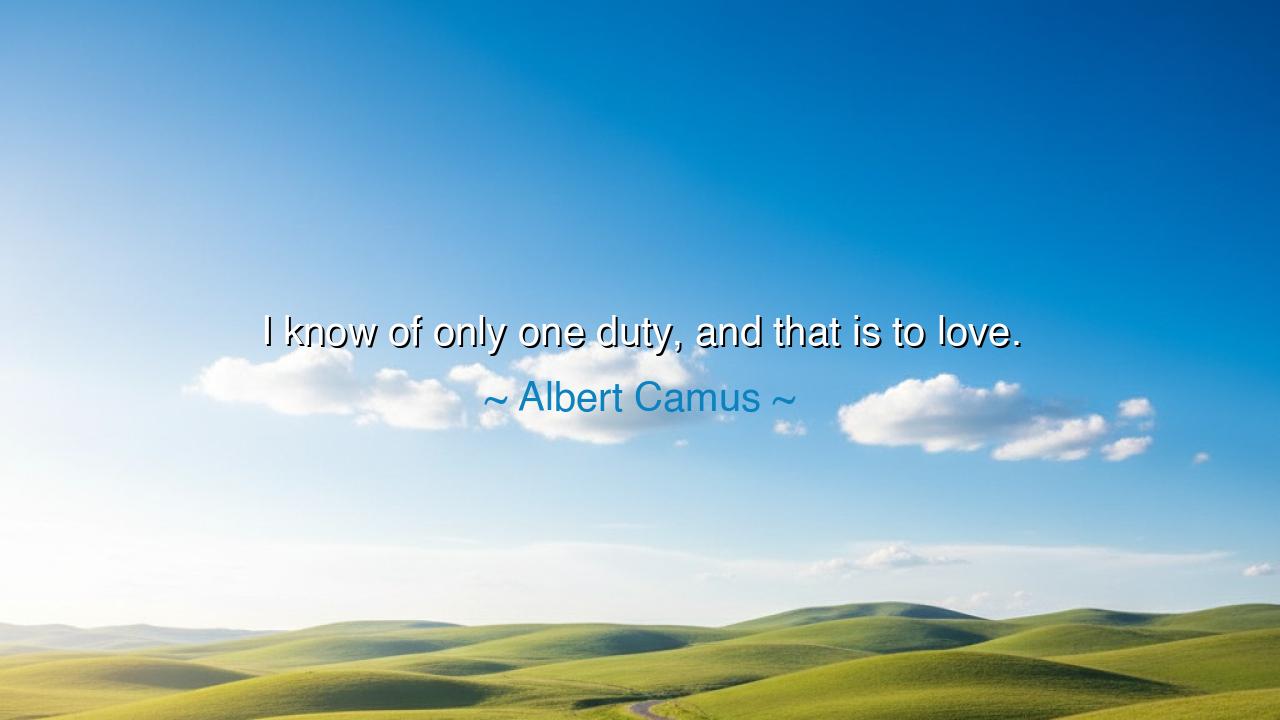
I know of only one duty, and that is to love.






“I know of only one duty, and that is to love.” Thus declared Albert Camus, the philosopher of light and shadow, who sought meaning in a world often cold and silent before the cries of the human heart. These words, brief yet eternal, rise like a flame against the darkness of despair. In them lies the essence of all morality, all purpose, all reason for being: that love—pure, unselfish, unmeasured love—is not one duty among many, but the very foundation upon which all others rest. Camus, though often called an existentialist, spoke not of nothingness, but of compassion; not of meaninglessness, but of the divine spark that survives even in a godless world.
To understand this saying, we must see it not as the confession of a romantic, but as the revelation of a man who walked through the ruins of human cruelty. Camus lived through the World Wars, when mankind had learned to destroy with precision and to justify its hatred in the name of ideology. In such a world, where morality crumbled and hope grew thin, he sought one truth that could not be corrupted by politics, fear, or ambition. That truth was love. For love, he saw, was the one force that asked for nothing in return, the one act that affirmed life even in the face of death. To love, he believed, was the only duty that gave meaning to existence—because to love is to resist the coldness of the world and to declare that life is still sacred.
This love, however, was not the fragile sentiment of the poet’s sigh. It was the active love of one who chooses to care when it would be easier to turn away, who chooses mercy when vengeance tempts the heart. To Camus, love was an act of rebellion—a defiance of despair. “If the world has no meaning,” he seemed to say, “then let us give it one through love.” It is the same wisdom that shone through the teachings of the ancients: that to love is to participate in the divine, to keep the soul alive amid ruin. For love is not weakness—it is strength made gentle. It is the courage to see beauty where others see futility, and to heal what the world has broken.
Consider the story of Father Maximilian Kolbe, a Polish priest imprisoned in Auschwitz. When a fellow prisoner—a father of young children—was chosen to die, Kolbe stepped forward and offered his life in the man’s place. He entered the starvation cell without fear, spending his last days comforting the dying. In that act, Kolbe fulfilled the very truth Camus spoke of. He did not fight with weapons, nor preach from a pulpit; he simply loved, and in doing so, he revealed the highest form of human duty. His sacrifice did not save the world, but it illuminated it, showing that even in the heart of hell, love could still bloom.
The origin of Camus’s thought lies in his search for meaning within the absurd—that condition of humanity which knows its longing for purpose yet finds none written in the stars. But in the midst of that silence, he found something greater than doctrine: the heart’s power to love despite its wounds. “I know of only one duty,” he said, not because there are no other responsibilities, but because all others—justice, truth, courage—are born from love. Without love, justice becomes cruelty, truth becomes arrogance, and courage becomes pride. Love is the seed from which all virtue grows; it is the law written not on stone, but in the soul.
The lesson is clear: if we wish to live fully, we must make love our compass. Love in word, yes—but more so in action. Love that listens when others shout. Love that forgives when hatred burns. Love that stands firm against injustice, not for gain, but because all life is sacred. To live without love is to live half-awake, to drift through life as a ghost of what one might have been. But to love—truly love—is to breathe deeply of existence, to feel its pain and beauty, and still choose to give.
So, my child of the wandering age, remember this: you were not born to conquer, but to care; not to own, but to give. Do not wait for perfection to love, for the world will never be perfect. Love in its brokenness; love in its uncertainty. Let your heart become a lantern in dark times. Let your hands become instruments of kindness. For though you may not heal the world, you will keep it alive—and in doing so, you will fulfill the one sacred duty that binds heaven to earth. For as Camus taught us, in the face of despair and chaos, there remains one truth that cannot die: the duty to love.






AAdministratorAdministrator
Welcome, honored guests. Please leave a comment, we will respond soon